Smart Cities
Mexico City: A Smart Megalopolis on the Rise
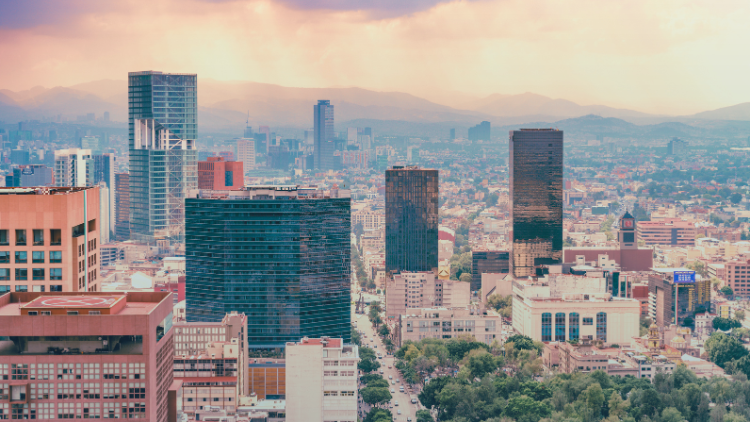
Evaluating whether Mexico City is a smart city would be a monumental challenge. With 22 million inhabitants in its metropolitan area and covering over a thousand square kilometers, Mexico City is the sixth most populous city in the world surpassed only by Sao Paulo (Brazil), Shanghai (China), New Delhi (India), or Tokyo (Japan) according to UN Habitat.
The elections on June 2 are crucial for Mexico City, as they will define the course of the next six years in a context of structural challenges such as insecurity, access to health, and the quality of public services. Mexico City, with more than 900 economic sectors and concentrating 31% of Foreign Direct Investment (FDI), is extremely complex. The 16 boroughs that make up the city suffer from deep social contrasts in which many people face different economic realities, marginalization, as well as unequal educational opportunities.
Two months before the elections, Clara Brugada, candidate for the alliance of the parties Morena, Green and Labor Parties; Santiago Taboada, candidate for the opposition Front composed PAN, PRI, and PRD; and Salomón Chertorivski from the Movimiento Ciudadano party are the three candidates to govern the city. Their proposals must not only offer solutions to the structural problems that citizens have been facing for several years, but they will be essential to achieve (or not) the Sustainable Development Goals (SDGs) from the 2030 Agenda.
If we aspire to build a city that responds to the needs of those who live in it, the vote must be cast thinking about the type of city in which we want to live and focusing on the proposal of leadership, reforms, and public policies that will affect our daily lives. At the Friedrich Naumann Foundation, we have been working since 2019 on the promotion of smart city strategies to improve quality of life and environmental sustainability.
Through the exchange of best practices with cities in Germany, Central America, the USA, Estonia, South Korea and Taiwan, we have promoted an agenda for smart cities in Mexico. Nevertheless, it is important to ask ourselves how smart is Mexico City today?
Advancements and Setbacks in Mobility
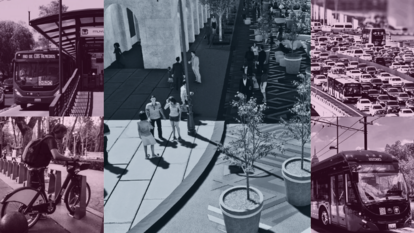
The way people move in cities in their day-to-day lives is one of the most important aspects of a city's life, largely determining how enjoyable or unbearable it is. To be smart, a city must offer efficient and sustainable transportation systems that improve citizen´s experience and reduce pollution.
The progress in mobility in Mexico City in recent decades has been extraordinary, especially considering its territorial magnitude and population density. Few cities in Latin America offer 12 metro lines or an integrated mobility system that includes the metro, metro bus, trolleybus, light rail, and bike lanes, benefiting around 180 million users. The commitment to micro mobility with over 300 kilometers of bike lanes as well as the increase of pedestrian zones are achievements that would have been unthinkable 20 years ago and show significant progress that other large cities in the country such as Monterrey or Guadalajara have not yet reached.
However, significant challenges persist. On the one hand, the urban mobility model that privileges the car still predominates, with infrastructure designed mainly for motor vehicles, a cost that everyone pays but that benefits only a few. On the other hand, while the mobility strategy has been a great success, the metro, with over 50 years of existence, faces maintenance and updating problems, resulting in accidents and constant disruptions that affect its nearly 6 million users. In 2021, only 9% of the metro's total budget was allocated to maintenance and repairs.
Whoever wins these elections must respond to and generate solutions to the unresolved mobility and security issues for all users, and focus on prioritizing collective mobility alternatives that are not only economical, but also faster, safer (especially for women), and more enjoyable than the car.
What are the candidates proposing?
Clara Brugada aims to promote and continue reforms that support the use of non-motorized vehicles. Santiago Taboda seeks to implement applications that allow users to plan their routes, extend service hours, as well as tax benefits to citizens who purchase electric or hybrid cars. Salomón Chertorivski is the one who has aimed at policies to have safer, affordable, accessible, and sustainable systems for all improving road safety.
Challenges in Economic Development
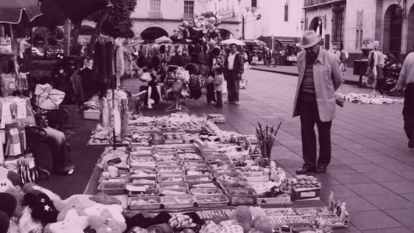
Promoting the formal economy is fundamental for the growth of a city that attracts and retains talent. A worldwide example as a city promoter of entrepreneurship and innovation is Berlin. However, unlike Germany, where there is a local initiative supported by a national institutional program, in Mexico there is no federal level institute for entrepreneurs, this prompted Mexico City to establish the Social Development Fund (FONDESO) to promote entrepreneurship and SMEs.
Although Mexico City is the entity that generated the most formal jobs in 2023, the technology sector is still lagging behind. The available incubators are mainly private or academic, such as Innova UNAM, Angel Ventures, or the Technological-based Business Incubation Center of the IPN, and there is a lack of effective collaboration between government, academia, and the private sector to boost technology companies.
The key lesson for a Smart City is that regulatory frameworks must be defined to promote entrepreneurship and become a Startup City. This allows digital companies, as well as social and environmental impact ventures, to improve service offerings and compete in the market. In this sense, these are the proposals of the candidates:
Brugada proposes to support small and medium-sized enterprises with tax incentives for the local economy through incubators and spaces for entrepreneurs promoting sustainable tourism, as well as economic zones focused on technology, advanced manufacturing, renewable energy, and industrial parks. Taboada suggests legal reforms to promote sustainable development and attract foreign investment towards infrastructure, as well as the creation of technological parks and remote work programs regulating the rights of workers to adapt to this model. Chertorivski proposes a policy of guaranteed market freedoms by economic competition and guarantees to investments establishing an economic and social council that can foster an alliance between the business sector, academia, and civil society.
Accessibility: Mexico City's Latent Crisis
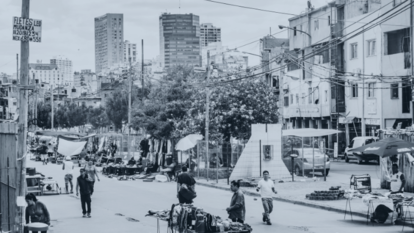
A smart city is defined by its ability to guarantee that all its inhabitants, especially the most vulnerable groups, can access all basic services without restrictions. The best practices in public policies to achieve an accessible city respond to questions such as: How much does it cost to live in the city? What percentage of the population has access to basic services? How does the quality of life in the city compare to other cities? How enjoyable are public spaces and urban life? In addition, what percentage of the population and residential areas have access to these quality spaces and activities? In this sense, Mexico City faces the greatest challenges.
According to the National Survey of Victimization and Perception of Public Security, 80% of capital dwellers perceive the city as unsafe, with high rates of crime, including robberies, homicides, and extortions. The three candidates propose the professionalization of security forces, improving their working conditions and salaries, emphasizing that opposition front proposes the use of artificial intelligence to improve data systematization and citizen security.
The pandemic aggravated Mexico City's economic challenges, combined with the strengthening of the peso, high interest rates and investment, Mexico City rose from 76th to 16th in the world ranking of the cost of living according to The Economist. This makes it an increasingly unaffordable city, surpassing even the cost of living in metropolises like Milan, Munich, or Washington DC. However, there is still a great contrast between the cost of living and the quality of life, evidenced by the persistent inequality in access to health, security, education, and job opportunities with decent wages.
Furthermore, the city faces the challenges of climate change and lack of long-term planning. In 2021, according to INEGI data, waste collection in the city was 106,000 tons per day, almost 850 grams of waste per person, making Mexico City responsible for 14% of the waste generated in the entire country. In summary, the year 2024 began with water scarcity throughout the valley, as a result of the city's main water supply source operating below capacity. It is mandatory that the short-term focus in the city goes beyond depending on rain and focuses on investing in rainwater harvesting infrastructure, treatment plants, and the regeneration of aquifers.
Bottom line: a city on the rise, but with obvious challenges
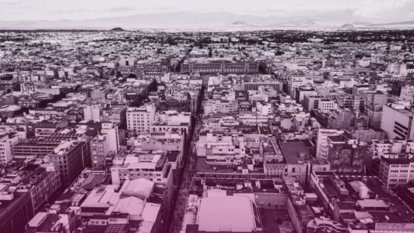
Faced with this context, the candidates' proposals are varied but still without a clear implementation strategy. Taboada proposes the "Return to the Lacustrine City" plan to improve water management, while Brugada focuses her proposals on the construction and maintenance of water infrastructure and Chertorivski, for his part, proposes innovative policies for water resources management. Final Balance: A City on the Rise, But With Evident Challenges
Although Mexico City may not have followed an "official" smart city strategy, the last twenty years have left results that we cannot ignore and that show significant progress for this megalopolis. Still, when evaluating the current state of the city, we find a mixed panorama. While it is true that significant progress has been made in various aspects, such as urban mobility, digital transformation driven since 2019, and the recovery of green areas and public spaces, it is also evident that it continues to face considerable challenges. Persistent insecurity, deficiencies in access to health and water, insufficient metro maintenance, and the lack of comprehensive programs to address educational and security needs are just some of the aspects that require urgent attention.
Mexico City cannot be considered a comprehensive smart city without programs for education, health, and security, as well as for water care and resource collection, much less on the path to meeting the 2030 Agenda. Candidate Clara Brugada constantly points in her speech to taking advantage of "Mexico's Moment"; candidates Taboada and Chertorivski aim at public policies and reforms. On the one hand, a Smart City strategy must be comprehensive and long-term, being taken up by all decision-makers, even in the face of changes in administration. On the other hand, whoever wins, as citizens, we have the responsibility to demand better Smart Cities practices because in the end, it is us who make the city. At the Friedrich Naumann Foundation we will continue to foster the exchange of best practices to promote smart cities.
